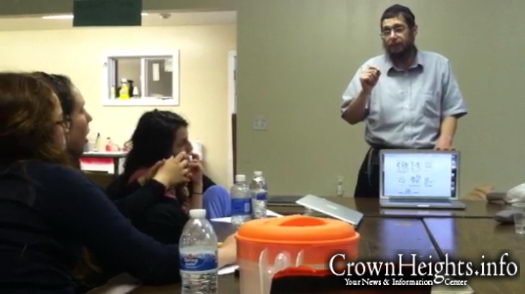
Young Women Delve into Summer Study
On a sunny morning in June, three minivans full of ambitious students pulled up on the grounds of Machon Batsheva in Greenfield Park in upstate New York. Classes began even before the girls had a chance to unpack.
“We’re here to study,” they said. “If we wanted a vacation, we would be in California.”
Machon Batsheva was created this summer by Rabbi Eli Silberstein, Chabadshaliach and professor of Jewish law at Cornell University in Ithaca, N.Y. He founded the program in memory of his mother, Batsheva Silberstein, who was a passionate activist for women’s learning.
The program is geared towards women in their early 20s who are looking for a rigorous educational experience. Rebbetzin Chave Hecht graciously hosted the program on the Camp Emunah grounds, and Fraidy Sabel was on site during the day to take care of the accommodations.
The inaugural program included a small group of young women from around the world who had studied at various seminaries in the past. They joined together because of their shared intellectual aptitude, enthusiasm and interest in text-based, in-depth Torah study.
The girls were up at 8 a.m. each morning for Rabbi Tzvi Freeman’s class. Freeman, author and senior editor at Chabad.org, took the students on a voyage through a complex Chassidic discourse. Afterwards, they spent hours reviewing and discussing the text with their learning partners, and preparing material for classes later in the day.
Silberstein kept the afternoons packed with study, covering the material they had prepared on their own that morning. His classes covered page after page ofTalmud, Shulchan Aruch and dozens of commentaries.
In the evenings, the girls enjoyed lectures and farbrengens with other members of the faculty, which included Rabbi Berel Bell, the founding dean of Bais Chaya Mushka Seminary in Montreal, Canada, and a member of the Rabbinical Court of Montréal; Nomi Freeman, spiritual counselor and lecturer at Chabad.org; and Rabbi Yisroel Shimon Kalmenson, archivist and researcher at Hanachos B’lahak Institute in Brooklyn, N.Y.
On the last day of the program, the students reflected on their time there. They said they felt that the program created an academic and focused learning environment, without becoming dry or competitive. The in-depth analysis of texts was new for many of the students, and they felt that it opened their minds to think in different ways. The teachers set high standards for the students, challenged them to develop new skills and encouraged them to explore texts on their own.
“I now know how much I don’t know,” said a participant from Brooklyn namedMiriam. “This program has opened new windows for me.”
Over two weeks, the 14 young women became a close-knit group. They plan to continue to learn together and hold study sessions in their communities.
The staff of Machon Batsheva hopes to expand next summer, continuing to provide participants with high-quality learning in an academic, yet comfortable, outdoor setting.













batsheva
yehi zichra baruch!
BEAUTIFUL
Chaya Mushka Freeman you are so amazing! Hashem just made some people perfect!